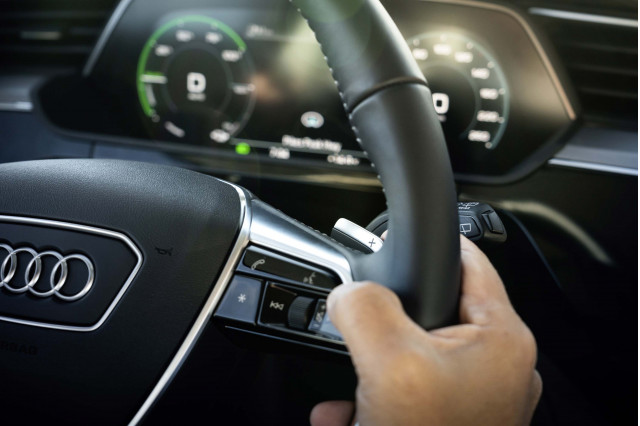Ignore the flashy, high-tech vehicle wrap, a cross between
pixelated camouflage and hunting orange. The 2019 Audi e-tron is a non-event
from inside, and that’s just what its maker intended.
When it goes on sale next year, the e-tron electric
crossover SUV will be the anti-Tesla. Its conservative crossover SUV shape will
draw no more and no less attention than the countless leased Audi Q5s that
infest big city streets like Japanese beetles mowing down a prized rose bush.
Its interior wows with its trio of screens and its dearth of buttons, but then
so does the Audi A6 parked across the showroom.
From the front seat, where I find myself perched next to
bespeckled Audi engineer Oswin Roeder as he gently guides this crossover SUV,
everything seems normal.
Well, other than the fact that this comfortable Audi is
gliding silently down the buttery smooth pavement at Pikes Peak as the sun
rises over our shoulders.

The Audi e-tron prototype I’m riding in has all the
hallmarks of a high-end, mid-size crossover SUV. Its doors close with a solid
“thunk,” the mix of leather and synthetic suede surfaces feels just right, and
its seat heaters are plenty warm for a chilly 32-degree morning at the summit
of of a Colorado mountain. A trio of screens handle infotainment, audio, and
instrument information. It's all very high-tech, but there's nothing
to be found here that doesn't show up in the latest Audi A6 and A8.
The e-tron’s ride quality is firm over the occasional bump
in the road, and it’s clear that the 21-inch wheels fitted to the prototype
contribute to little lean into corners.
Roeder’s voice barely rises above a whisper as the e-tron
snakes down the mountain before tourists begin to arrive. He’s attempting to
explain why we didn’t drive up Pikes Peak in the e-tron. The focus of this
drive, he tells us, is to show how effective the e-tron is at recuperating
power from coasting and from using its unique braking system. In most
situations—90 percent, Audi optimistically estimates—the vehicle’s hydraulic
braking system, including its pads and rotors, will be charged but not activated.
Instead, its two electric motors—one per axle—handle braking until the pedal is
pressed extra hard, such as during an emergency maneuver. That’s when the
hydraulic system kicks in to bring the e-tron to a halt.
To wit: about halfway down Pikes Peak sits a small hut,
where a park ranger uses an infrared thermometer gun to check brake
temperatures of every vehicle. The e-tron’s front brakes are barely above the
ambient temperature, about 55 degrees at this point.
Flatlander tourists sometimes cook brakes to the tune of 500
degrees.
“We see it all the time,” the park ranger chuckles. “But we
smell it first.”
Certainly, Roeder’s careful driving has something to do with
the low temperatures. But it’s also a reminder that the e-tron’s electric
motors have done nearly all of the braking downhill.

Paddle shifters mounted behind the e-tron’s steering wheel
control three levels of recuperation.
Level 0, signified by a tiny marker in the digital
instrument cluster, means the e-tron drives like a normal car. Level 1 amps up
the electric motors’ deceleration for something closer to one-pedal driving.
Two taps of the paddles activates Level 2, which Roeder says is true one-pedal
driving.
source: https://www.motorauthority.com/news/1118102_2019-audi-e-tron-first-ride-pulling-all-the-brakes
by Andrew Ganz
http://www.boscheuropean.com

No comments:
Post a Comment